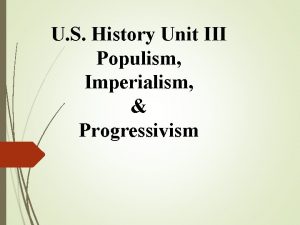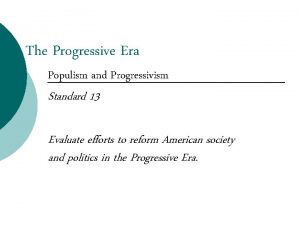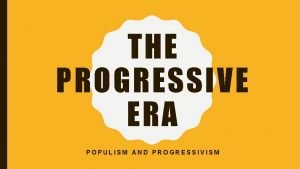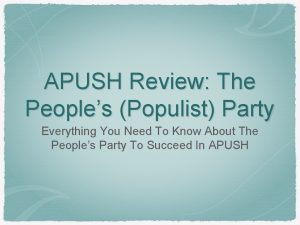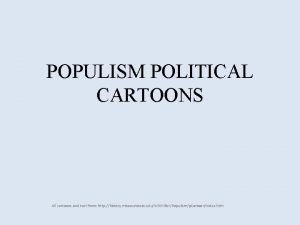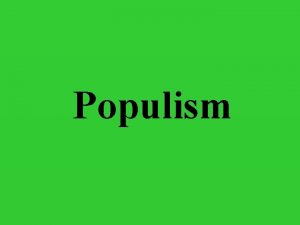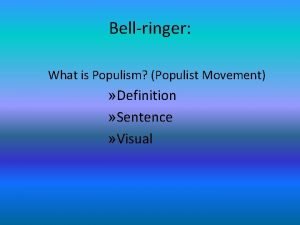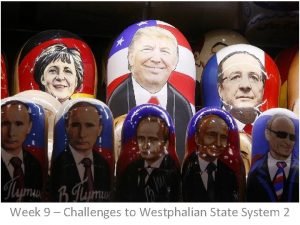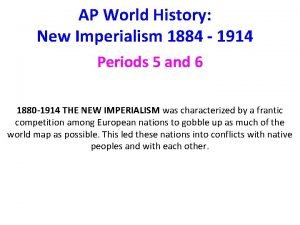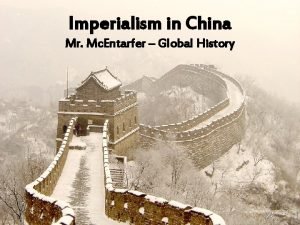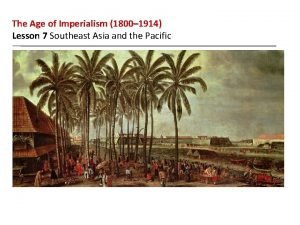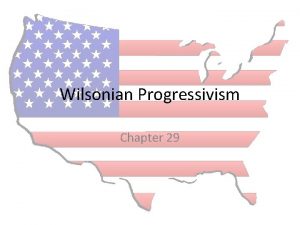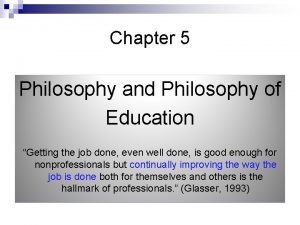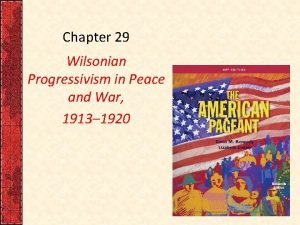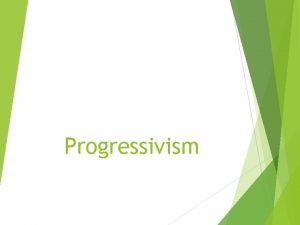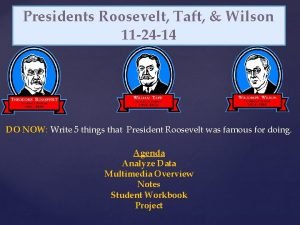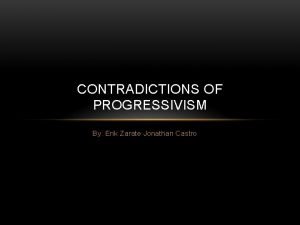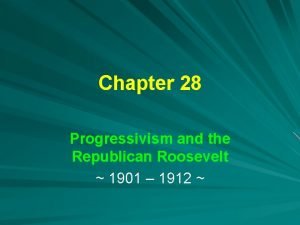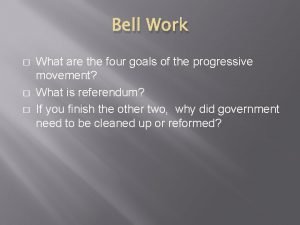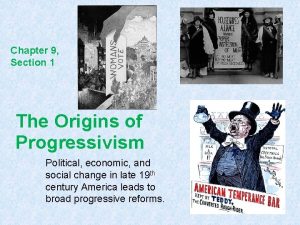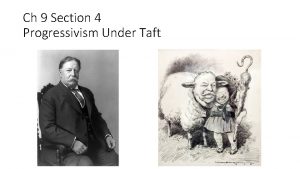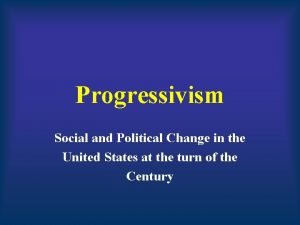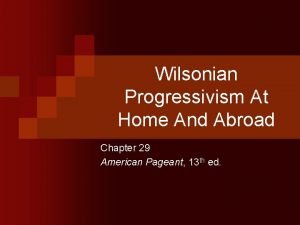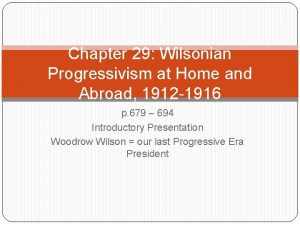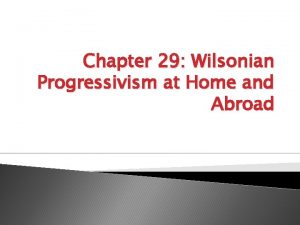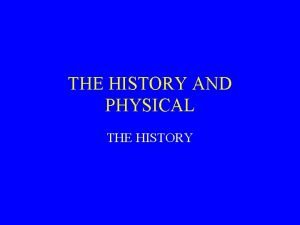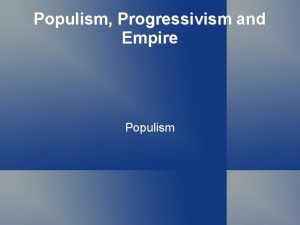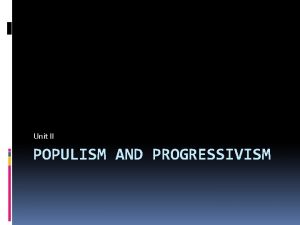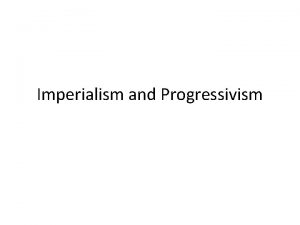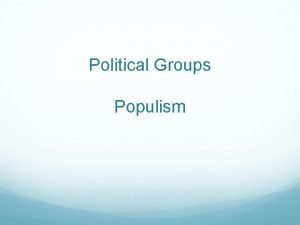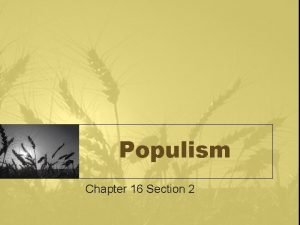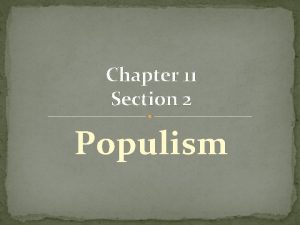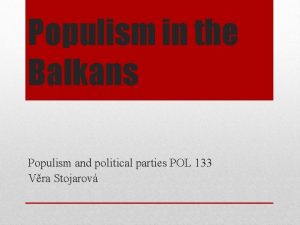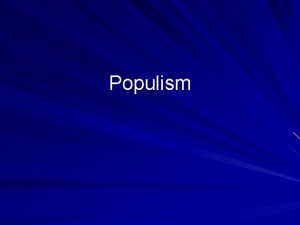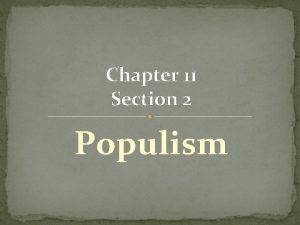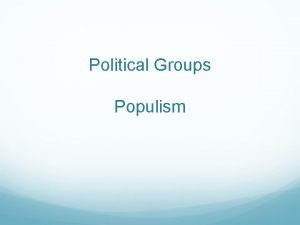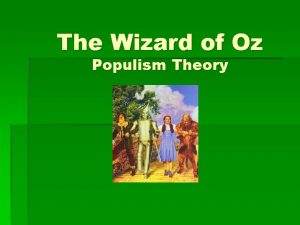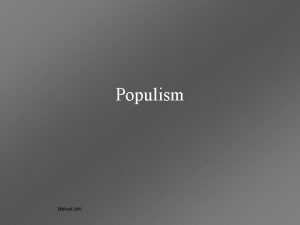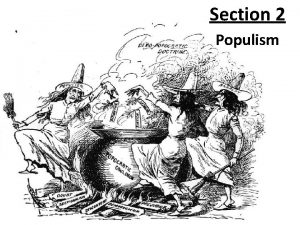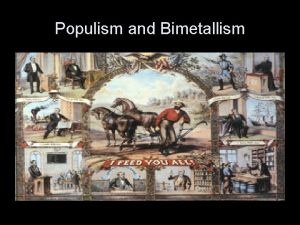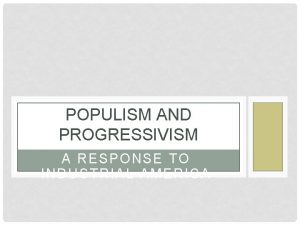U S History Unit III Populism Imperialism Progressivism









































- Slides: 41

U. S. History Unit III Populism, Imperialism, & Progressivism

Rural Problems People moving to the West and South in the late 1800 s knew that their lives would not be easy. Problems facing the farmers of the West and South low prices for crops high transportation, equipment, and loan costs drought domination of markets by a few They did not anticipate the many problems that made survival nearly impossible.

Farmers created groups to address their problems. These groups formed a network called the Grange movement. The Grange was formally organized by Oliver H. Kelley in 1867 and gained a million members. The Grange declined after the 1870 s, but Farmers’ Alliances became important reform organizations that continued the Grange’s goals.

The spread of the Farmers’ Alliances led to the formation of the Populist Party in 1892. The Populist platform warned about the dangers of political corruption, an inadequate money supply, and an unresponsive government. They called for: coinage of silver an income tax government ownership of railroads bank regulations

The debate over monetary policy was an important issue of the day. Those who wanted only a gold standard were on one side. Those who wanted to use silver and gold— including the Populist Party— were on the other.

An economic depression began in 1893, and labor unrest and violence broke out. The Populist Party grew. In 1896, a young lawyer named William Jennings Bryan spoke at the national Democratic convention. The speech, with its Populist message of “free silver, ” moved Democrats to nominate Bryan. The Populist Party chose to give him their support.

Mc. Kinley won against Bryan in 1896 and in 1900. Bryan’s emphasis on money reform wasn’t popular with urban workers.

The Populist Party was weakened by supporting William Jennings Bryan on the Democratic ticket. It survived another decade, but its viability as an alternative to the two major parties was over. Many of the reforms sought by the Populists eventually became reality. The new campaigning style used by Bryan became the norm.

THE IMPERIALIST VISION Throughout the 19 th century America expanded control of the continent to the Pacific Ocean By 1880, many American leaders felt the U. S. should join European nations and establish colonies overseas Thus began America’s foray into Imperialism – the policy in which stronger nations extend control over weaker nations

THE U. S. ACQUIRES ALASKA In 1867, Secretary of State William Seward arranged for the United States to buy Alaska from the Russians for $7. 2 million Some thought it was a silly idea and called it “Seward’s Icebox” Time has shown how smart it was to buy Alaska for 2 cents an acre Alaska is rich in timber, minerals and oil ka Alas

U. S. TAKES HAWAII Hawaii had been economically important to Americans for centuries To avoid import taxes (tariffs), sugar growers pleaded for annexation The U. S. knew the value of the Islands – they had built a naval base at Pearl Harbor in 1887 Led by Sanford Dole, American annexed Hawaii in 1898 and it formally became a state in 1959

Mahan and Imperialism • In 1890, Alfred Thayer Mahan published The Influence of Sea Power Upon History • In his book, Mahan expressed that a nation benefited from having a strong navy and the overseas bases needed to maintain it. • His work resonated with many politicians, who were eager to establish the US as a world power.

Spanish-American War In the last decades of the 19 th century, some Americans were eager to spread democracy into Latin America. Other Americans argued that American expansion was not the best way to spread America’s democratic traditions. In 1898, the United States went to war with Spain after the Spanish refused to grant independence to rebels fighting a revolutionary war in Cuba, a Spanish colony.

Yellow Journalism When Cubans unsuccessfully rebelled against Spanish rule in the late 19 th century, American sympathy went out to the Cuban people “Yellow Journalists” William Randolph Hearst (New York Journal) and Joseph Pulitzer (New York World) exaggerated Spanish brutality in “Headline Wars”

U. S. S. MAINE EXPLODES Before After Early in 1898, President Mc. Kinley ordered the U. S. S. Maine to Cuba in order to bring home American citizens in danger On February 15, 1898 the ship blew up in the harbor of Havana More than 260 men were killed Newspapers blamed the Spanish for bombing the U. S. S. Maine (recent investigations have shown it was a fire inside the Maine)

Supporters of American expansion were eager to gain U. S. territory in Latin America, leading to a “war fever” that also encouraged the U. S. to seek a military solution to the Cuban war for independence. The war lasted less than four months. Teddy Roosevelt grabbed national attention by advocating war with Spain in 1898. He became a national hero, and was later elected president. His volunteer cavalry brigade, the Rough Riders, won public acclaim for its role in the war.

• The Spanish were driven out of Cuba, which became an independent country, and out of Puerto Rico, which became an American territory. • Cuban independence came with a price. American troops would be withdrawn from the island only after it accepted certain duties and restrictions spelled out in the Platt Amendment.

Philippine-American War After the Spanish-American War, some officials pondered to either expand U. S. territory to include the Philippines or respect Filipino independence. When the U. S. military was ordered to keep the Philippines as an American territory, the Philippine-American War broke out, in 1899. The war lasted about three years. In the end, the Philippines was a U. S. territory until 1946.

Boxer Rebellion China was weakened by wars, and European nations colonized China. Resentment arose, and a secret society formed, known as the Boxers. In 1900, the Boxers rioted, killing and vandalizing all things foreign. Foreign Troops were called in to put down this “Boxer Rebellion”

Open Door Policy The emergence of powerful European spheres of influence in Southeast Asia led to the US Open Door policy. After the Boxer Rebellion, the US issued a series of Open Door Policies, seeking commerce, not control. These policies would keep China’s markets open to all countries. The goal of these policies was to encourage China to allow US business activity. TR’s successful efforts to end the war between Japan and Russia (1904– 1905) brought him the Nobel Peace Prize in 1906. Roosevelt’s “Big Stick” Diplomacy Roosevelt purposefully displayed U. S. power to the world, in part to keep other nations from fighting. He described this policy saying, “Speak softly and carry a big

The Panama Canal Roosevelt encouraged a revolt in Central America in 1903 due to Colombia refusing to allow construction of the Panama Canal. The US militarily supported Panama’s declaration of independence from Colombia so the US could Cost- $380 million Workers dig a canal through – Over 40, 000 (5, 600 died) Time – Construction took 10 years Panama.

In 1902 Venezuela defaulted on its debts. In response, European countries blockaded Venezuelan ports. Roosevelt declared that the United States would intervene in Latin America to keep the region stable. He claimed that it is in the best declaration of the US to intervene in nations whose political stability is threatened. His declaration became known as the Roosevelt Corollary to the Monroe Doctrine.

Taft’s Dollar Diplomacy President William Taft’s Dollar Diplomacy focused on creating stability abroad for the benefit of U. S. commercial interests. U. S. banks steadily took over the business of loaning Latin American countries money. This helped ensure that Europe would have no cause to intervene in the region. In Nicaragua, loans made to help stabilize the government were not enough. Unable to quell social unrest, the government called on the US, which sent in the marines to keep the peace.

Wilson’s Moral Diplomacy Woodrow Wilson hoped to base his foreign policy on moral principles. Mexican Revolution In 1913 General Huerta seized power in Mexico from a reformer who seemed to favor democracy. In 1914, an incident in Mexico involving U. S. sailors offered Wilson a chance to overthrow Huerta. After Congress voted to allow him to use force, Wilson found out about an arms shipment to Veracruz, Mexico. He sent marines to shell the city and take it by force. Two years later, incursions into the United States by the Mexican revolutionary Pancho Villa drew another military response. Wilson sent soldiers into Mexico to capture Villa, but they failed to find him.

ORIGINS OF PROGRESSIVISM As America entered into the 20 th century, middle class reformers addressed many social problems Work conditions, rights for women and children, economic reform, environmental issues and social welfare were a few of these issues

FOUR GOALS OF REFORMERS Protect Social Welfare Industrialization in the late 19 th century was largely unregulated. Employers felt little responsibility toward their workers. Promote Moral Improvement Some reformers felt that the answer to societies problems was personal behavior. Carrie Nation began the Temperance movement, which proposed prohibition alcohol. Create Economic Reform The Panic of 1907 led to more citizens being in favor of increased government regulation in the economy and the banks. Some Americans began to embrace socialism. Foster Efficiency Many people put their faith in scientific principles to make society better. Some industries began using time & motion studies to complete tasks quickly.

Muckrakers Many reforms came about after journalists investigated and exposed socioeconomic problems in need of political attention. These journalists were called muckrakers, and famous among them were Upton Sinclair and Ida Tarbell. A common theme in their writings was exposing the immorality and greed of U. S. businesses and the corruption in government.

Upton Sinclair In his novel The Jungle, Sinclair told the story of European immigrants working in Chicago’s meatpacking industry. The book exposed the poor labor practices and unsanitary conditions that produced contaminated food. Congress was pressured to pass laws to regulate the meatpacking industry and to require meat packers to produce food that was safe to consume.

Ida Tarbell In a series of magazine articles, Tarbell exposed political corruption in New York, Chicago, and other cities, and criticized Standard Oil Company’s unfair business practices. Her findings angered the public and contributed to the government’s decision to break up the Standard Oil Trust.

Progressive Era Reforms Progressive election reforms helped to increase ordinary citizens’ direct control of government in 3 ways: 1. Supporters of any new law may collect voters’ signatures on an initiative to force a public vote on the issue. 2. When enough citizens support an initiative, the government must present the issue to the public as a referendum on which the public may vote. 3. Citizens may remove public officials from office before their terms expire by organizing a recall election.

THE MODERN PRESIDENT Traditional Republican’s oppose regulation of business. Roosevelt established himself as a Progressive Republican, favoring increased regulation of business. Business Reform By 1900, Trusts – legal bodies created to hold stock in many companies – controlled 80% of U. S. industries. Roosevelt filed 44 antitrust suits under the Sherman Antitrust Act Gentlemen’s Agreement To calm the growing tension between the U. S. and Japan over the immigration of Japanese workers, Roosevelt asked San Francisco officials to overturn a policy that placed Asian children in segregated schools. The Japanese government agreed to limit the number of passports issued to laborers trying to enter the U. S.

1902 COAL STRIKE In 1902 140, 000 coal miners in Pennsylvania went on strike for increased wages, a 9 -hour work day, and the right to unionize Mine owners refused to bargain Roosevelt called in both sides and settled the dispute Thereafter, when a strike threatened public welfare, the federal government was expected to step in and help

More Roosevelt Reforms Child Labor As the number of child workers rose, reformers worked to end child labor. In 1906 laws were passed setting a minimum age for employment and a maximum number of hours children could work. Workplace Safety Progressives pushed for workers’ compensation laws to pay workers injured on the job. Consumer Safety Because of muckraking, by 1906, citizens had become more aware of the dangers in food and drugs. Roosevelt and Congress passed the Meat Inspection Act. Under the Food and Drug Act passed in 1906, it became illegal to sell or ship any impure or falsely labeled food or drug.

Conservation & Teddy Roosevelt He began a Progressive conservation movement, which conserved millions of acres of wilderness lands, particularly in western states. Roosevelt established more than 50 wildlife sanctuaries and several national parks. These national park systems included Yosemite in California and Yellowstone in Wyoming.

Reforms During Taft’s Presidency Roosevelt criticized Taft for undermining the system of cooperation and regulation established during his administration. Workplace Safety Taft established the Children’s Bureau in 1912. This agency investigated and publicized problems with child labor. Taft was not popular with the American public nor reform minded Republicans

Progressive Election Woodrow Wilson (Democratic Party) Ran as a progressive promising a “New Freedom. ” He wanted to dismantle trusts. Theodore Roosevelt (Bull-Moose Party) The former president who helped form the Progressive Party when the Republicans nominated Taft. Roosevelt wanted to increase regulation of trusts. William Howard Taft (Republican Party) The incumbent president. He was seen by many as representing pro-business interests. The Republicans ending up splitting the vote, leading to Wilson winning the presidency.

Wilson Reforms The Clayton Act prevented companies from acquiring stock from another company (Anti-monopoly) The Act also supported workers unions Wilson worked hard to lower tariffs, however that lost revenue had to be made up Ratified in 1916, the 16 th Amendment legalized a graduated federal income tax

African American Activists Ida B. Wells began a courageous crusade against lynching. Mary Church Terrell began a battle against racism and sexism. Terrell extended her efforts to fighting for women’s suffrage with Jane Addams and Susan B. Anthony. Booker T. Washington encouraged African Americans to concentrate on achieving economic goals. W. E. B. Du Bois argued that there was no advantage in temporarily giving up civil rights.

Women’s Suffrage Susan B. Anthony began the Women’s Suffrage movement in 1848. The National Woman Suffrage Association (NWSA) focused on passing a constitutional amendment. The American Woman Suffrage Association (AWSA) wanted state governments to give women voting rights. The groups joined in 1890, forming the National American Woman Suffrage Association (NAWSA). As more states granted women suffrage, Congress passed the Nineteenth Amendment in 1920, giving women the right to vote.

Progressivism Governmental Reform Triumphs The federal government took a greater role in people’s lives, offering protections and to the public. Business Reform Antitrust regulation was passed. Labor Reform Child labor, the minimum wage, the workday, and working conditions became regulated. Suffrage Women gained the right to vote. Safety Standards Meat inspection, Food and Drug regulation, and work safety were all implemented. Conservation The national parks were created.

Progressivism’s Failures Civil Rights The Progressive movement did next to nothing to dismantle segregation or attack lynching. Native American Rights Little was done to help Native Americans; in fact, in many instances, rights continued to be denied. Women’s Rights Although women did attain suffrage, full equality was still not recognized.
 Imperlaist
Imperlaist Progressive legislative actions
Progressive legislative actions Populism and progressivism
Populism and progressivism Motives of old imperialism
Motives of old imperialism New imperialism vs old imperialism
New imperialism vs old imperialism Hamlet act iii scene iii
Hamlet act iii scene iii Wizard of oz populist
Wizard of oz populist Secret ballot apush
Secret ballot apush What does glinda the good witch represent in populism
What does glinda the good witch represent in populism Populism political cartoons
Populism political cartoons Wabash v illinois
Wabash v illinois Populist movement definition us history
Populist movement definition us history Stankov political economy of populism download
Stankov political economy of populism download Populism oxford dictionary
Populism oxford dictionary Boxer rebellion ap world history
Boxer rebellion ap world history Monroe doctrine cartoon meaning
Monroe doctrine cartoon meaning World history imperialism vocabulary
World history imperialism vocabulary Global history imperialism in china
Global history imperialism in china Contrast siam's fate to that of burma and vietnam
Contrast siam's fate to that of burma and vietnam Wilsonian progressivism
Wilsonian progressivism Philosophy of education
Philosophy of education Progressivism philosophy of education
Progressivism philosophy of education Progressivism teaching philosophy
Progressivism teaching philosophy 5 educational philosophies
5 educational philosophies Chapter 29 wilsonian progressivism in peace and war
Chapter 29 wilsonian progressivism in peace and war What were the four goals of progressivism?
What were the four goals of progressivism? Progressivism definition
Progressivism definition Roosevelt taft and wilson venn diagram
Roosevelt taft and wilson venn diagram Existentialism curriculum
Existentialism curriculum Progressivism def
Progressivism def National progressive republican league
National progressive republican league What are the four goals of progressivism
What are the four goals of progressivism The origins of progressivism chapter 9 section 1
The origins of progressivism chapter 9 section 1 Richard ballinger definition
Richard ballinger definition Progressivism where will you put your million dollars
Progressivism where will you put your million dollars Characteristics of progressivism in education
Characteristics of progressivism in education American pageant chapter 29
American pageant chapter 29 Wilsonian progressivism at home and abroad
Wilsonian progressivism at home and abroad Wilsonian progressivism at home and abroad
Wilsonian progressivism at home and abroad Unit 10, unit 10 review tests, unit 10 general test
Unit 10, unit 10 review tests, unit 10 general test Also history physical
Also history physical Causes of imperialism
Causes of imperialism
